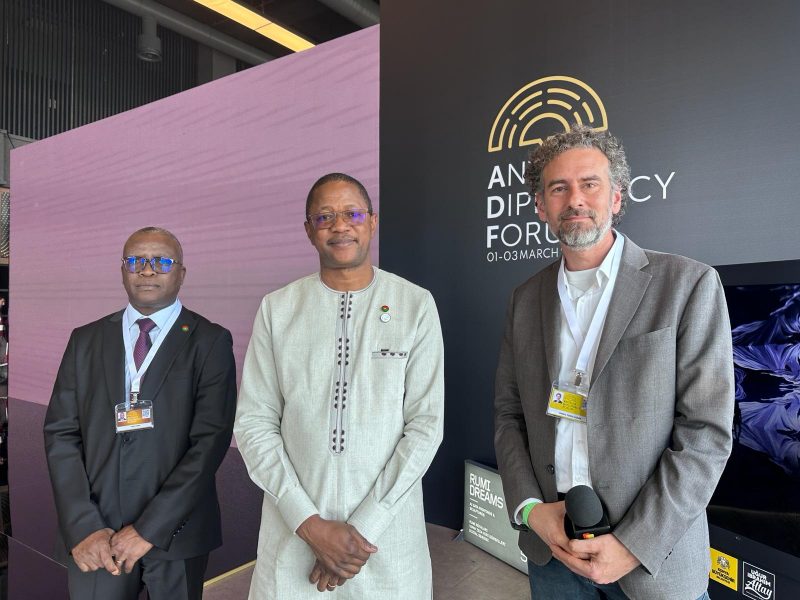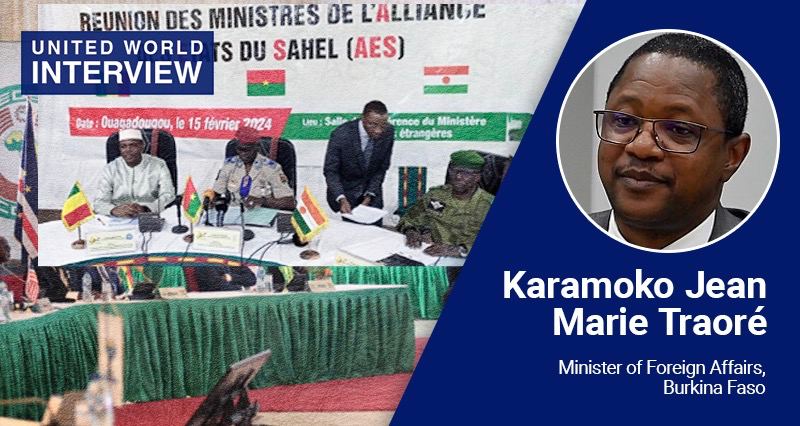Burkina Faso, Mali and Niger dominate the headlines in West Africa and beyond with their breakaway from the ECOWAS and the establishment of a new alliance. Their governments frequently state a new phase of struggle against neocolonialism that goes along with the opening up to the realities of a multipolar world.
On these issues, we spoke with Karamoko Jean Marie Traoré, Minister of Foreign Affairs, Regional Cooperation and Burkinabe Abroad of Burkina Faso.
Burkina Faso, Mali, and Niger have founded the Alliance of Sahel States. What is the reason behind this step?
This is a response to a dynamic of perpetuation of our countries in West Africa, especially within the ECOWAS. Burkina Faso, Mali and Niger have noted that this space does not permit true liberation. So, we made the sovereign decision to establish ourselves within a new alliance called the Alliance of Sahel States and which offers a new opportunity for liberation to our countries.

Why a new opportunity?
Because it is a more coherent, more relevant, more functional space that will allow us to face the challenges of the day. These are the security challenges, the challenges of underdevelopment and above all the challenges of alienation, including to the neighboring countries.
If you follow the dynamics carefully, this alliance is, if you like, the translation of a popular appeal. For a long time, our people have also demanded that from our leaders. They demanded an ear to their aspirations. What they aspire are public policies designed to correspond to their reality.
Popular aspirations are translated into public policy
That hasn’t been the case for years. We were in a dynamic where we tended to impose constraints on the country and on the populations. Today, it is about reversing the trend and ensuring that popular aspirations are translated into public policy.
This much more appropriate approach will allow us to be more autonomous in our decisions, in our political choices, and to be more effective on the ground to the extent that the responses we provide correspond to real demand, to real needs in the field.
There are newly emerging players in Africa. One of them is Türkiye. What is the role Ankara can play on the continent and in Burkina Faso? What is the potential for cooperation between Burkina Faso and Türkiye? And what can Latin America do in terms of South-South integration with Burkina Faso and West Africa?
We have a long-standing friendship and cooperation with Türkiye, which has resulted in several concrete actions on the ground. And we also share with Türkiye the reality of terrorism. And in this matter, we had a lot to share. I think the two countries immediately found their dialogue framework.
Cooperation with Türkiye in the framework of a partnership
And Türkiye and Burkina Faso cooperate in defense and security matters which produces quite concrete results on the ground, and which really allow us to move forward in our fight against insecurity. This is the first point.
The second point, regarding aspects of development aspect, Türkiye and Burkina also have great potential. The difference in relations with Türkiye is that we are in a framework of partnership, rather than a relation of a dominant and dominated party.
Currently, the Sahel States are looking for partners who deal with them in an approach of mutual respect.
Latin America and Africa “have a common struggle”
With Latin America, it’s the same. We know the difficult relationships they have had with the North in their ambition of development, in their ambition to offer their people fulfillment. Africa and Latin America have a common history. Africa and Latin America have a common struggle.
And this fight is first and foremost that of liberation, it is the fight of having access to a space of expression in the same way as other citizens of the world. So, in this, I think that Burkina, Mali, Niger and the countries of Latin America have several shared values.
Thank you very much for this interview.
This interview was previously published in Spanish on TeleSUR TV here.
















Leave a Reply